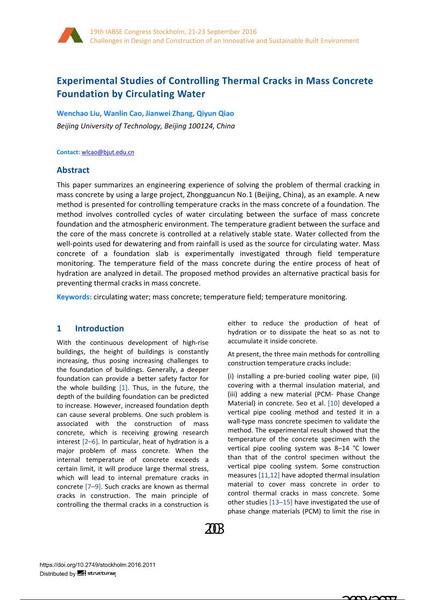Experimental Studies of Controlling Thermal Cracks in Mass Concrete Foundation by Circulating Water

|
|
|||||||||||
Détails bibliographiques
| Auteur(s): |
Wenchao Liu
(Beijing University of Technology, Beijing 100124, China)
Wanlin Cao (Beijing University of Technology, Beijing 100124, China) Jianwei Zhang (Beijing University of Technology, Beijing 100124, China) Qiyun Qiao (Beijing University of Technology, Beijing 100124, China) Fei Yin (Beijing University of Technology, Beijing 100124, China) |
||||
|---|---|---|---|---|---|
| Médium: | papier de conférence | ||||
| Langue(s): | anglais | ||||
| Conférence: | IABSE Congress: Challenges in Design and Construction of an Innovative and Sustainable Built Environment, Stockholm, Sweden, 21-23 September 2016 | ||||
| Publié dans: | IABSE Congress Stockholm, 2016 | ||||
|
|||||
| Page(s): | 2003-2012 | ||||
| Nombre total de pages (du PDF): | 10 | ||||
| Année: | 2016 | ||||
| DOI: | 10.2749/stockholm.2016.2011 | ||||
| Abstrait: |
This paper summarizes an engineering experience of solving the problem of thermal cracking in mass concrete by using a large project, Zhongguancun No.1 (Beijing, China), as an example. A new method is presented for controlling temperature cracks in the mass concrete of a foundation. The method involves controlled cycles of water circulating between the surface of mass concrete foundation and the atmospheric environment. The temperature gradient between the surface and the core of the mass concrete is controlled at a relatively stable state. Water collected from the well-points used for dewatering and from rainfall is used as the source for circulating water. Mass concrete of a foundation slab is experimentally investigated through field temperature monitoring. The temperature field of the mass concrete during the entire process of heat of hydration are analyzed in detail. The proposed method provides an alternative practical basis for preventing thermal cracks in mass concrete. |
||||
